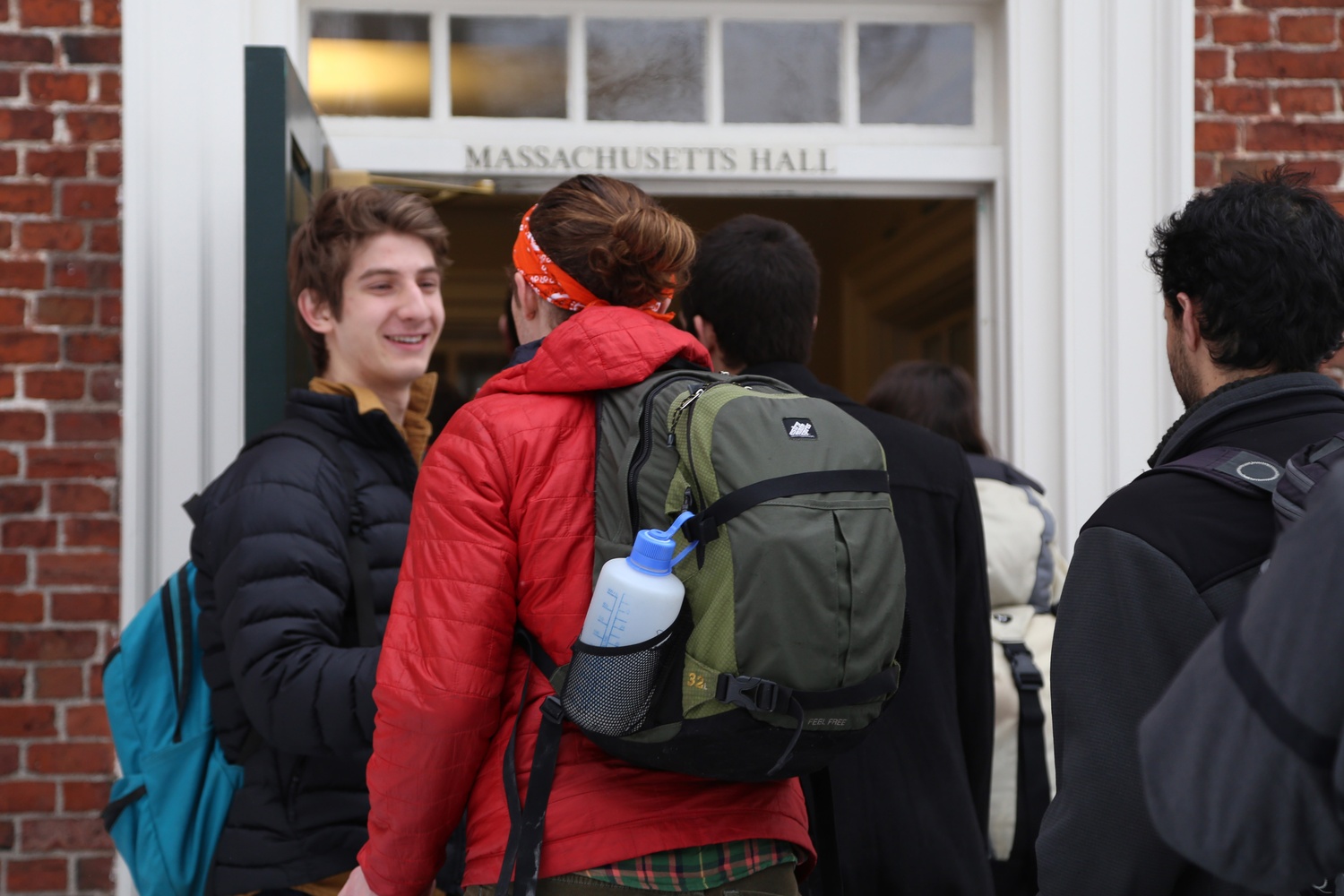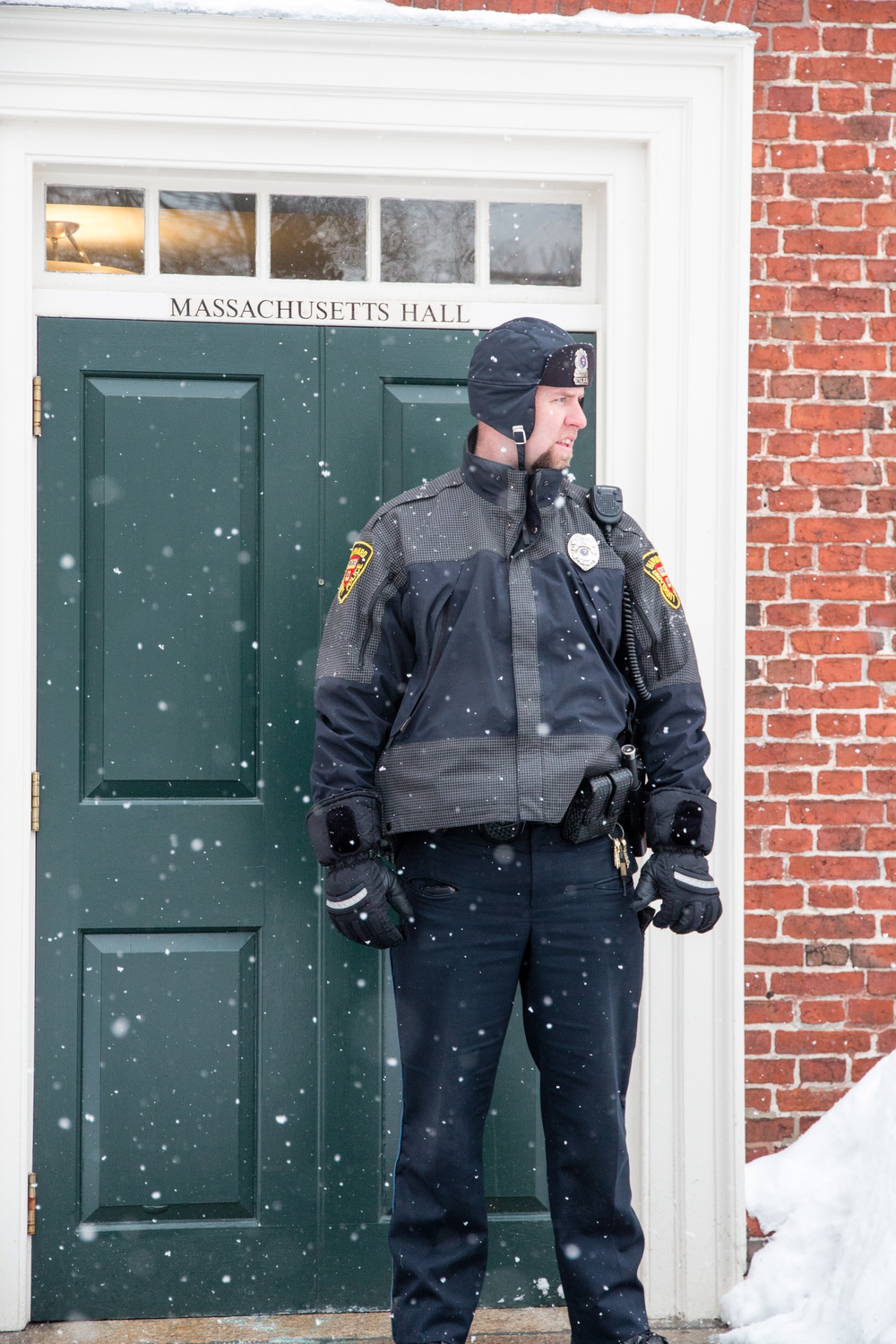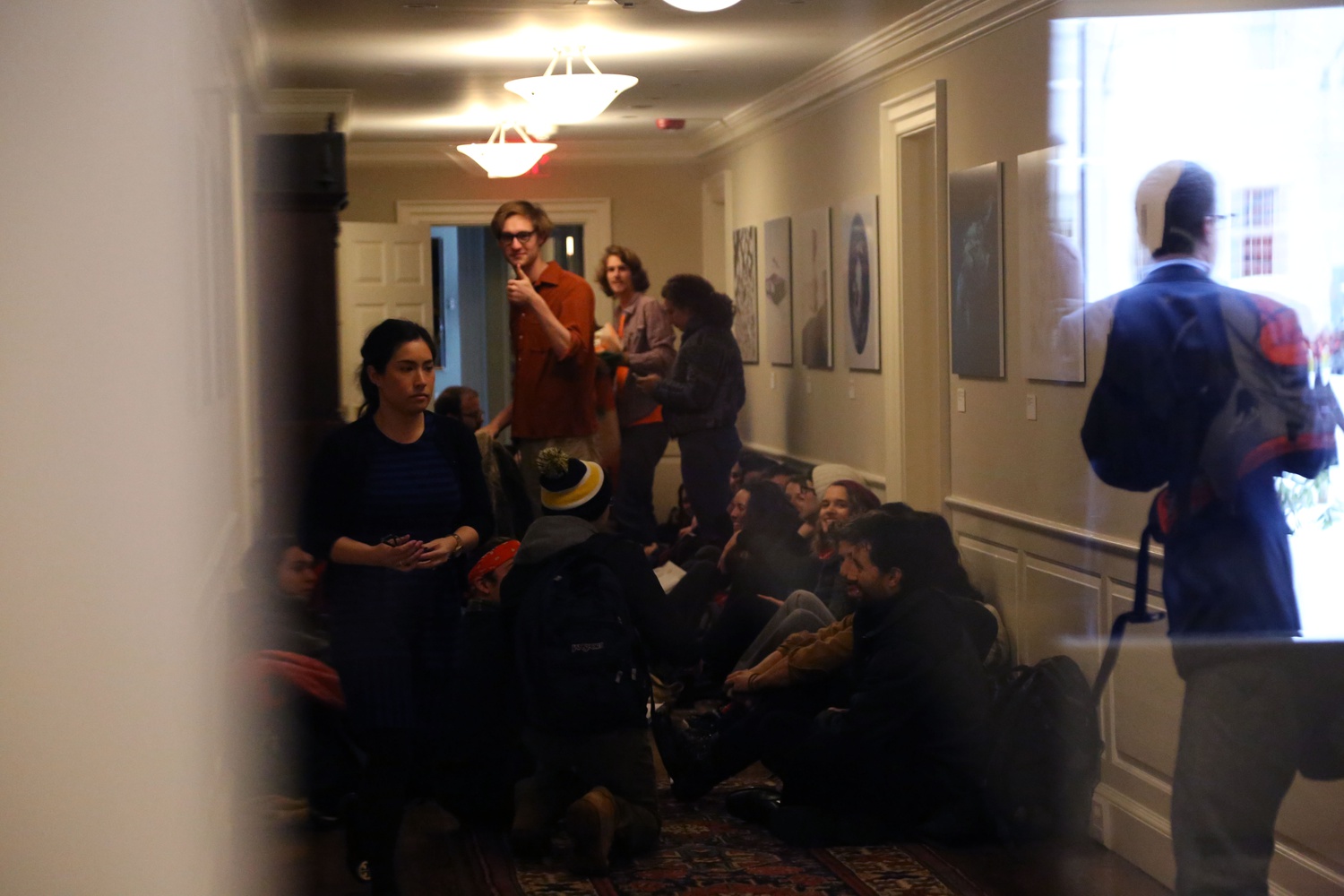
News
Harvard Researchers Develop AI-Driven Framework To Study Social Interactions, A Step Forward for Autism Research

News
Harvard Innovation Labs Announces 25 President’s Innovation Challenge Finalists

News
Graduate Student Council To Vote on Meeting Attendance Policy

News
Pop Hits and Politics: At Yardfest, Students Dance to Bedingfield and a Student Band Condemns Trump

News
Billionaire Investor Gerald Chan Under Scrutiny for Neglect of Historic Harvard Square Theater
Demanding Divestment, Protesters Occupy Mass. Hall
Divest Group Rushed Central Administration Office Building Around 10 a.m.
UPDATED: February 13, 2015, at 2:14 a.m.
Roughly 20 students remained in Massachusetts Hall, home to the office of University President Drew G. Faust, late Thursday night after a group of more than 30 stormed and occupied the building that morning, demanding that Harvard divest its $35.9 billion endowment from fossil fuels.
Though the group, Divest Harvard, detailed plans on Thursday night for a Friday afternoon rally outside of Mass. Hall, co-coordinator Talia K. Rothstein '17 said that the remaining protesters had no immediate plans to leave the building.
The occupation began Thursday morning at about 10 a.m. when more than 30 members of Divest, many dressed in orange, entered the building and followed an administrator through a door that would otherwise have been locked. Once inside Mass. Hall’s first floor hallway, which contains the offices of Faust, Provost Alan. M. Garber ’76, and others, the protesters quickly hoisted a banner calling on Harvard to divest.
By 10:10 a.m., a receptionist had called the Harvard University Police and officers had arrived at Mass. Hall.
After the protesters settled in, chronicling their entrance on social media along the way, Faust offered to meet with protesters at a location outside of the building, but only on the condition that the protesters leave, according to Jeff Neal, her spokesperson.

The group refused. Instead they offered counterproposals, including meeting with Faust inside Mass. Hall or sending two delegates to another location for the meeting and leaving the rest of the group inside the hallway.
Divest Harvard member Canyon S. Woodward ’15 said the occupation plan had been in the works since last fall, but he would not say how long the protesters, who were accompanied by a filmmaker, planned to stay.
“We’re trying to put as much pressure on them as possible,” Woodward said Thursday morning. “We are going to reiterate our call for divestment—we’re no longer settling for a meeting—we have to take action now.”
Officials have not made the extended stay comfortable. Sometime in the early afternoon, HUPD officers blocked the only bathroom the protesters had access to and encouraged the Divest Harvard group to use one elsewhere, according to Rothstein. Rothstein said some protesters had brought diapers.
As the sit-in wore on, Divest’s continued presence brought reactions from the administration. In an emailed statement Thursday afternoon, Neal wrote that while administrators respect the activists’ views, they are “deeply disappointed” in the protestors’ decision to occupy Mass. Hall, which he called “disrespectful and coercive interference.”
“Today and in the future, our students will be treated with the respect they have chosen not to accord those who work in the building,” Neal added.
Divest Harvard responded with a group statement in the late afternoon, writing that the group was “saddened by [Faust’s] characterization of our action when we are continuing a legacy of civil disobedience that has brought real change to our university.”
When the protesters had not left late Thursday night, Neal released another statement after he was asked for an update on the administration’s response.
“While we are disappointed that student-activists have chosen to adopt these disruptive and disrespectful tactics,” he wrote, “Harvard remains committed to the teaching, learning and research that will bring real solutions to climate change.”
Earlier in the evening, the group of protesters became slightly smaller when HUPD officers said non-Harvard affiliates could face criminal charges for trespassing, according to Rothstein. Officers also photographed the protesters and their Harvard identification cards. According to Kelsey C. Skaggs, a Harvard Law School student who left the sit-in around 5 p.m., the protesters were told that their schools would be notified of their participation.
Thursday’s sit-in fell on the eve of Global Divestment Day, planned by activists to push for divestment from fossil fuels. It is not the first major protest that the Divest Harvard campaign, which has been active for more than two years, has executed at Mass. Hall—last spring, several members blocked the front entrance of the administrative building. One of its members was arrested, but Harvard did not press charges.
Faust has repeatedly argued against divestment, characterizing it as neither “warranted or wise” in an October 2013 open letter.
In 2001, a group of protesters occupied Mass. Hall for 21 days, forcing then-President Neil L. Rudenstine to work elsewhere. That group was campaigning for higher wages for Harvard employees. After the occupation, many Harvard workers did receive wage hikes.
—Check TheCrimson.com and follow @thecrimson on Twitter for updates.
—Staff writer Theodore R. Delwiche can be reached at theodore.delwiche@thecrimson.com. Follow him on Twitter @trdelwic.
—Staff writer Mariel A. Klein can be reached at mariel.klein@thecrimson.com. Follow her on Twitter @mariel_klein.
Want to keep up with breaking news? Subscribe to our email newsletter.
Related Articles
From Our Advertisers

Over 300+ courses at prestigious colleges and universities in the US and UK are at your disposal.

Where you should have gotten your protein since 1998.

Serve as a proctor for Harvard Summer School (HSS) students, either in the Secondary School Program (SSP), General Program (GP), or Pre-College Program.

With an increasingly competitive Law School admissions process, it's important to understand what makes an applicant stand out.

Welcome to your one-stop gifting destination for men and women—it's like your neighborhood holiday shop, but way cooler.

HUSL seeks to create and empower a community of students who are seeking pathways into the Sports Business Industry.





